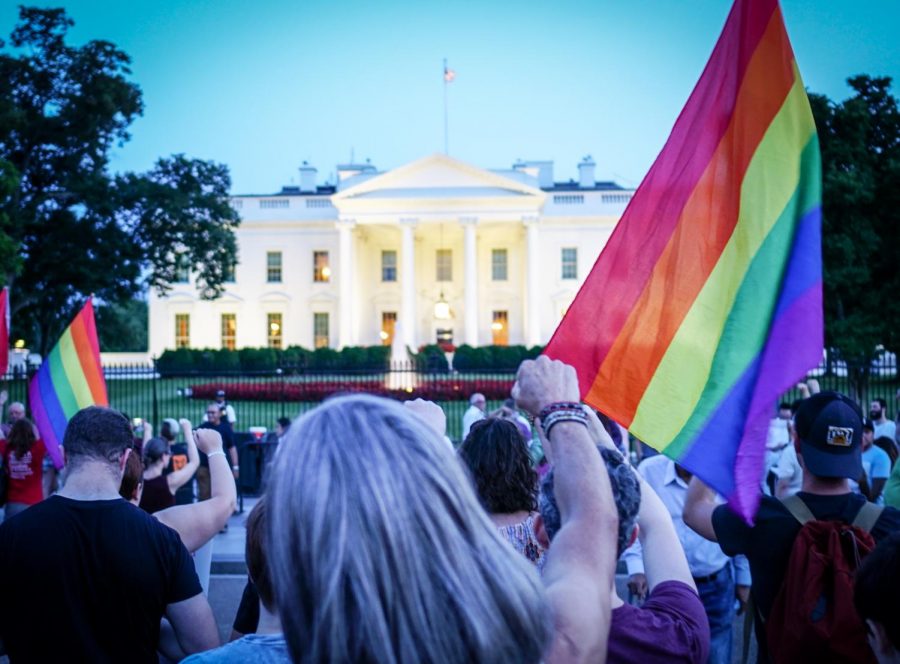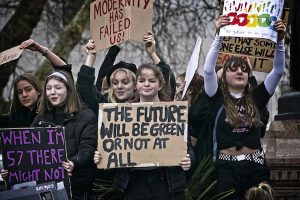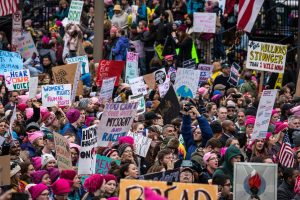Election feature: LGBTQIA+ protections
An image from the 2017 Protest Trans Military Ban in front of the White House
Nov 2, 2020
This article is part of The Carroll News Elections Series, written by the students of the Fundamentals of Journalism class. For more information on these series, check out this introduction!
According to Gallup, roughly 4.5% of Americans identify as members of the LGBTQIA+ community. As this number rises, it is paramount to protect this community. As the United States nears an election, it’s important to know what voters and candidates believe the government should do to protect the LGBTQIA+ community.
Salomon Rodezno is the director of the Center for Student Diversity and Inclusion at John Carroll University. Rodezno, a member of the LGBTQIA+ community, participated in a Zoom interview on Oct. 5 with members of the Fundamentals of Journalism class, where he stressed that he was speaking personally, not on behalf of the CSDI.
Rodezno said he finds it very important, in the upcoming elections, to make sure that proper measures are taken to ensure the safety and equality of the LGBTQIA+ community. He believes that problems with protections for the LGBTQIA+ community begin at the top.
“We need a president who accepts everyone who is a part of America,” said Rodezno. “The current administration is a direct attack on diversity and education.”
As recently as this past July, Ben Carson, who was appointed by President Donald Trump as Secretary for the Department of Housing and Urban Development in 2016, formally announced a rollback of a previous rule that protected transgender people from discrimination by homeless shelters and other housing services that receive federal funding, according to the National Center for Transgender Equality.
In February of this year, the Department of Justice filed a court brief in the Western District of Kentucky expressing the government’s view that anti-LGBTQIA+ discrimination is not of sufficient importance to the government to overcome objections of private businesses that wish to deny services to LGBTQIA+ people and offer a federal opt-out to local non-discrimination laws, reported the National Center for Transgender Equality.
The 2020 Republican Party Platform also does not mention the term LGBT once on the official party’s platform, which is the same platform as 2016.
The Democratic Party, in contrast, vows in its 2020 platform to “enact the Equality Act and at last outlaw discrimination against LGBTQIA+ people in housing, public accommodations, access to credit, education, jury service and federal programs.”
The Democrat’s platform also pledges to “work to ensure LGBTQ+ people are not discriminated against when seeking to adopt or foster children, protect LGBTQ+ children from bullying and assault and guarantee transgender students’ access to facilities based on their gender identity.”
But there is more work to be done. While Rodezno is not running for office, he still presented some very strong policies and ideas for how to protect the LGBTQIA+ community.
Rodezno specifically mentioned protections against discrimination in the workplace. In some places, he said, being a member of the LGBTQIA+ community can affect job security. According to Rodezno, some members find it difficult to find jobs and sometimes have to go “back into the closet” to find work.
Some landlords discriminate against members of the LGBTQIA+ community, he added, and sometimes gay people find their loan requests denied because of their sexual orientation or gender identity.
Different states have different levels of protection for the LGBTQIA+ community, and the levels range from full protections to virtually nothing. Ohio falls somewhere in the middle, as adoption and parenting are legal across the board for LGBTQIA+ people, but the state only officially recognizes protections for employment and leaves protections up to cities and counties for housing and public accommodations. Ohioans who are openly transgender cannot serve in the military and may not change their gender on their birth certificate.
Rodezno sees enacting universal protections across the states as a key part of institutional reform. The federal government currently guarantees some civil rights to the LGBTQIA+ community, such as equal age of consent, anti-discrimination laws in employment, adoption and the right to change legal gender.
Another point Rodezno said is that more people must become educated on the issues faced by the LGBTQIA+ community and other minorities.
“When people who are not affected by an issue come to have an understanding of that issue, that is when the ball can get rolling. When people who are not affected have a sense of their belonging and safety disrupted, they may understand better.”
Rodezno also emphasized “putting on shoes” that do not align with your identity, or in common terms, putting yourself in someone else’s shoes.
The LGBT Center of Greater Cleveland hopes that Ohioans will do research on House Bill 160: The Ohio Fairness Act. HB 160 would pass further protections for the LGBTQIA+ community for housing, workplace and public accommodations.
Republican Congressman Anthony Gonzalez and his Democratic challenger in Ohio’s 16th District, Aaron Paul Godfrey, are important to people like Rodenzo, who spoke of Americans needing candidates with great rhetorical skills and concrete plans.
Gonzalez was asked to comment on HB 160 and LGBTQIA+ protections but did not respond. Godfrey, however, was very cordial and agreed to an interview about protections for the LGBTQIA+ community.
“I think it is very important,” said Godfrey. “This is an issue that is similar to women’s rights where in the South you may need to cross state lines to get an abortion. It is similar for LGBTQ+ rights, as states have a hodgepodge of rules that depend on what state you live in. A lot of people, especially [college aged], … don’t always see these as big issues because culturally your generation grew up with LGBTQ+ classmates, friends and family. It is legal, and to people who grow up around it, that naturally means it’s normal.”
Godfrey thinks education ties in with protections.
“At the end of the day, a lot of states are held back by regressive state assemblies who don’t want these things to be legal and will do everything in their power to prevent people,” said Godfrey. “We don’t have as many protections as we could have, and every time a new protection is brought up, it is immediately shot down by conservative members who are barely qualified. Just look at Amy Coney Barrett. She has had three years as a judge, and now she is going to be a Supreme Court justice, and frankly, that is insane.
“Education is important because [educated] people are more aware of how unequal things are,” Godfrey added, “and that awareness would bring more pressure on these legislators to take actions and make things as fair as they should be.”
As Godfrey and Rodezno said, it is important for Americans to educate themselves. As we get deeper into election season, all we can do is continue to inform ourselves on issues that affect not just us, but those around us. And, of course, vote!














